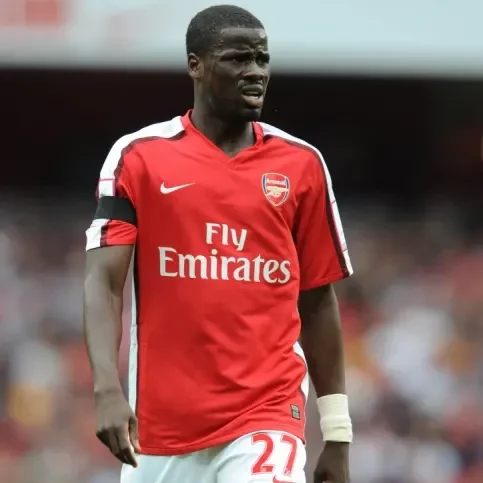
Emmanuel Eboué
Date of birth: 4 June 1983
Place of birth: Abidjan, Ivory Coast
Nationality: Ivorian
Height: 1.78 m (5 ft 10 in)
Position(s): Right back
Arsenal Senior Career: 2004-2011
Senior Apps/Goals: 214/10
General Information
Emmanuel Eboué (born 4 June 1983) is an Ivorian former professional footballer best known for his time as a right-back with Arsenal in the mid-2000s. Energetic, versatile, and charismatic, Eboué became a fan favorite at the Emirates for his tireless work rate, marauding runs down the flank, and infectious personality on and off the pitch. While his career at Arsenal had its highs and lows, he remains remembered as a cult hero and a vital contributor during a transitional era for the club under Arsène Wenger.
Early Life and Beginnings in Ivory Coast
Eboué was born in Abidjan, Ivory Coast, where football was a central part of his upbringing. Like many young Ivorian players, he developed his skills in local street football, displaying speed, stamina, and natural athleticism from a young age. His talent eventually took him to ASEC Mimosas, one of Africa’s most prestigious academies, which had already produced a wealth of Ivorian stars. At ASEC, Eboué refined his defensive skills and tactical awareness, combining raw energy with greater positional discipline.
Move to Europe
In 2002, Eboué moved to Belgium to join KSK Beveren, a club known for its strong links with ASEC and for offering opportunities to Ivorian talent. His time at Beveren proved essential in adapting to European football, as he gained valuable experience against physically stronger opponents and improved his technical ability. His solid displays soon attracted the attention of Arsène Wenger, who had long-standing scouting ties in Belgium and a sharp eye for developing young talent.
Arsenal Career (2004–2011)
Eboué signed for Arsenal in 2004 and initially joined the reserve team before breaking into the first team later that year. His breakthrough came in the 2005–06 season, when he impressed in the Champions League. Thrust into the starting lineup due to injuries, Eboué delivered dynamic performances, helping Arsenal reach the 2006 Champions League final. Although Arsenal lost to Barcelona, Eboué’s energetic runs and defensive resilience highlighted him as one of the standout performers of the campaign.
During his Arsenal career, Eboué transitioned between playing as a right-back and further forward as a right midfielder. Wenger often deployed him on the wing to utilize his pace and dribbling. While his defensive positioning was occasionally questioned, his attacking contributions added a different dimension to Arsenal’s style. His overlapping runs complemented players like Thierry Henry, Cesc Fàbregas, and Robin van Persie, creating width and momentum in the team’s attacking play.
Eboué played a key role in Arsenal’s run to the 2007 League Cup final and featured regularly in both Premier League and European competitions. His versatility, willingness to adapt, and relentless energy ensured he was a valued squad member during Arsenal’s transitional years from Highbury to the Emirates Stadium.
International Career with Ivory Coast
On the international stage, Eboué was an important figure for the Ivory Coast during their rise to prominence in the mid-2000s. He earned over 70 caps for his country and represented the Elephants at two World Cups (2006 and 2010) and multiple Africa Cup of Nations (AFCON) tournaments. Eboué played a significant role in Ivory Coast’s journey to the AFCON final in 2006, where they narrowly lost to Egypt in a penalty shootout.
Playing Style
Eboué was best known for his stamina, pace, and attacking instincts. As a right-back, he often bombed forward to support the attack, delivering crosses and stretching opposition defenses. His dribbling ability allowed him to beat players one-on-one, while his energy meant he could cover ground quickly to recover defensively. Though sometimes criticized for lapses in concentration, his overall influence was positive, and his versatility allowed Wenger to deploy him in multiple roles.
Beyond his technical and tactical traits, Eboué was loved for his personality. His cheerful demeanor, humor, and interactions with fans made him one of the most charismatic characters in the Arsenal dressing room. Supporters remember him for lighthearted moments—such as playful pitch-side antics and his ever-present smile—as much as for his on-field contributions.
Later Career
In 2011, Eboué left Arsenal after seven years and joined Galatasaray in Turkey. At Galatasaray, he enjoyed a successful spell, winning multiple domestic league titles and cups. His experience and professionalism helped strengthen the squad, and he became a reliable presence for the Turkish giants. After leaving Galatasaray in 2015, his career was disrupted by contractual issues and later financial difficulties, which limited his opportunities to continue playing at the highest level.
Challenges After Retirement
Eboué’s post-playing career was unfortunately marked by personal and financial struggles. Reports emerged of his difficulties adjusting to life after football, including bankruptcy and personal hardship. However, his story also sparked important conversations about financial planning, mental health, and support structures for retired footballers. Despite these challenges, Eboué’s resilience and open nature have continued to endear him to fans who remember him fondly from his playing days.
Legacy
Emmanuel Eboué’s time at Arsenal is remembered as a mixture of energy, joy, and cult status. Though not always the most consistent performer, his passion for the game and unique character made him one of the most memorable players of Wenger’s era. His role in Arsenal’s Champions League run in 2006 remains a highlight, while his cheerful personality secured him a special place in the hearts of Arsenal supporters.
Eboué’s journey reflects the unpredictable nature of football careers—marked by great highs, personal challenges, and enduring connections with fans. At Arsenal, he may not have been the most decorated star, but he was certainly one of the most beloved, embodying the spirit of determination, entertainment, and humanity that resonates with the club’s history.
| Season | Appearances | Goals |
| 2004/05 | 4 | 0 |
| 2005/06 | 32 | 1 |
| 2006/07 | 35 | 1 |
| 2007/08 | 36 | 0 |
| 2008/09 | 44 | 4 |
| 2009/10 | 36 | 3 |
| 2010/11 | 27 | 1 |

